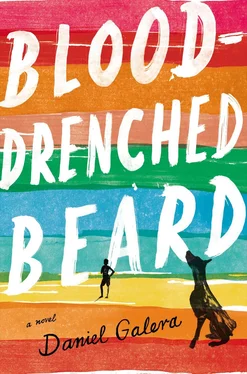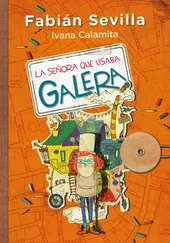There were some guys here staring at the water saying that some lunatic was swimming in his underpants with a dog. I stopped to take a look and thought, hmm, I think I know that guy.
It was me.
Don’t you feel the cold?
I’m freezing. But this sun’s helping a bit.
You’re lucky there’s no wind.
Wasn’t there an excursion today?
No, we didn’t have the numbers. Frota, the owner, stayed in the office, and I went to church early today. I stopped off here for a maté before going home.
Do you go to church?
On Sundays. I’ve been going to the chapel on the square there. It’s gorgeous. Have you ever been inside?
No.
Don’t you have a religion?
No. Do you?
Oh, I believe in God. That’s all. I was brought up that way. Church on Sundays ever since I was a child. It does me good to pray. The act of going and praying. I know it’s irrational. I wish I could stop, but I can’t.
I wanted to believe at some stage, but I couldn’t.
It doesn’t matter. God doesn’t care about that. But I doubt he likes it when people play with life like you do. You’re blue. Blue people tend to wake up in a hospital with hypothermia. You should get home quickly.
I think I’d rather stay here a bit longer.
She stares at him, and despite his best efforts he ends up looking away.
Then have a maté to warm up.
She presses the button on the Thermos, and the stream of steaming-hot water gurgles noisily through the maté leaves and into the gourd. Beta was following her own nose, already a distance away, but now she is returning to her owner with her crippled gait. Jasmim hands him the gourd and watches her, intrigued.
What’s your dog’s name?
Beta.
What’s wrong with her?
She was run over. The vet wanted to put her down, but I didn’t let her, and in the end she pulled through. She’ll have to have physiotherapy to see if she can walk properly again, but I had the idea to put her in the water to exercise. There was a guy that used to come and exercise his pit bull in front of my apartment almost every night. It’d spend hours fetching a plastic bottle from the water. It got me thinking. I know a little about post-op hydrotherapy. It’s helpful with spinal injuries, and it can’t be very different for veterinary purposes. That’s what gave me the idea. I think it was a bit of intuition too. And she reacted well. When she was released from the clinic, she couldn’t even wag her tail. And not only is she improving, but she’s taken a liking to water. Did you see her? She’s learning how to break through the waves.
He sips the hot maté, and his body relaxes a little.
Do you go in the water with her every day?
Yep.
She stares at the dog and doesn’t say anything else until he finishes the maté and returns the gourd.
I have to go now. It’s really cold. Look, I—
I’ll call you next week to arrange something.
I waited for you to call. I don’t have any way to write down your number now, but if you dial my number—
I’ll call you.
I’d like that a lot. Have a good day.
You too. Go and get warm.
• • •
S he doesn’t call but two days later shows up without warning at sunset. They sit in front of his building, looking at the ocean and drinking maté until the last scrap of light is absorbed by the night, and then they go inside and continue talking in the living room with the window ajar. She pats Beta and says she misses buying loose yerba maté leaves at the Porto Alegre Public Market. Mixed, you know? Pure leaves with coarsely ground Ximango. She says she isn’t hungry but changes her mind when he starts to inspect the cupboards and fridge and announces that he has a packet of chicken nuggets in the freezer. As a child, she spent her free afternoons watching the afternoon movie on TV and eating nuggets with ketchup. She repeats that she doesn’t drink when she has to ride her motorbike afterward, but she accepts a glass of Chilean red. Jasmim listens to him succinctly narrate his father’s recent suicide with scientific interest and says that there are famous cases of people who killed themselves out of boredom or because they were tired, people who were naturally inclined to see death as a pragmatic issue. Live as long as it’s worth it, as long as it’s useful. She is interested in suicides. People think that those who kill themselves are depressed, have given up, or can’t take things anymore, but there are many kinds of suicide, such as honor suicide, kamikaze suicide, suicide for the benefit of others, suicide because of old age, suicide because of an incurable chronic disease, suicide to prove an intellectual argument or promote an idea, protest suicide. She tells him about the recent case of a young American psychologist who killed himself in the middle of the street and left an almost two-thousand-page suicide note talking about Auschwitz and the rise of a technological God engendered by mankind, a huge philosophical, theological, sociological, and scientific argument to give meaning to a bullet through his brain. She read about two hundred pages of it. The whole thing is on the Internet. Then he tells her what he knows about his grandfather, and she tells him to be careful poking into that kind of old story involving death and mystery because the people of Garopaba are very superstitious, and she has had problems with it herself because of a local legend about buried treasure. They say that when someone dreams three times that there is treasure buried in a certain place, it’s because there is, but if the person who dreamed about it digs up the treasure, they die. Just ask around — there are people who really believe it. They say a guy died last year over in Ouvidor because of it. He dug a hole in the place he had dreamed about, found something, and died at home for no apparent reason. She says that these cursed treasures were supposedly buried by Jesuits who were here in the seventeenth century, before the region was colonized, to catechize the Carijó Indians and take them to Rio de Janeiro. Did you know that the town of Tubarão is named after an Indian chief who refused to be converted? He said that God hadn’t made him for heaven, but to live on the earth. Tubarão means “fierce father” in Tupi-Guarani, not “shark,” as it does in Portuguese. It’s in the Garopaba history books. I can lend you one. Anyway, people believe that the Jesuits left silver objects buried here and there, gold coins, that kind of thing. Some fifteen years ago they found a kind of vase in the shape of a ram’s head buried in Encantada. It was made out of a metal that looked like bronze, and no one could say what it was. Have you ever heard of the Caminho do Rei? There are lots of bed-and-breakfasts and gated communities named after it these days. It’s a trail in the hills that still exists and was used by the Jesuits and colonizers. It had its origins in an indigenous path that came from the Pacific, crossed the whole Inca Empire, and ended here on the coast of Santa Catarina. Many legends date back to that era and — he interrupts her and asks what it has to do with her problems. Well, I’d heard of this legend about the buried treasure and the three dreams, and maybe for that very reason I ended up dreaming that there was treasure buried under the steps leading up to my front door. The first time was almost a year ago. And more recently I dreamed the same thing again. I thought it was funny and made the mistake of mentioning it to some people in Ferrugem. One day I was at the supermarket buying some things, and a really old man came up to me. I knew him by sight: it was old Joaquim, a local who makes fishing nets over by the lagoon. I don’t know exactly how old he is, but he looks about eighty. He’s blind in one eye, really rickety. He took hold of my arm and asked me about my dreams. He told me that when I dreamed about it for the third time, I couldn’t dig up the treasure or I’d die. He said to call him, and he’d dig it up. At first I was amused, but I started to get scared. He was dead serious. Since then he’s been keeping an eye on me, and I’ve seen him prowling around my house twice with a young man who looks like a psychopath who must be his grandson or something. He’s really sinister. Legends might be harmless, but sometimes the people who believe in them aren’t. Your granddad’s story sounds a bit like that. Don’t invest too much energy in these things. Folk tales can bury reality forever. You’ll only be able to reconstruct what really happened up to a certain point. The rest becomes legend. And it’s pretty cool, isn’t it? Having a granddad who’s kind of a local legend. Yes, it is, he agrees. He hadn’t thought of it in those terms before. He wishes he could think of other things in her terms too and wants to tell her this but can’t find the words. She pauses, eats the last nuggets, and sips the wine. He stretches, stares at the intestinal-looking fluorescent light tube on the ceiling, and lets the pleasure of listening to her settle for a few seconds. I’m talking too much, she says. Tell me more about yourself. When he mentions that he did the Ironman in Hawaii, she gets excited and wants to know everything. What was it like? What’s Hawaii like? What do you guys eat during the race? How do you train for it? He shows her his medal, and she turns it over carefully, as if it were fragile. She seems shocked by the object. It’s just a medal for completing the race, he tries to explain. Even so it’s incredible. Have you thought about entering again? No way, those days are over. Don’t be silly. You should do it again. Aren’t there people who do it at the age of fifty or sixty? Isn’t this the perfect place to train for it? I don’t know, but people say it’s the perfect place to be happy. Jasmim is perplexed by this comment, and he has to explain that it is just a joke based on the guarantees of bliss that he has heard from so many people since he arrived. People say that kind of thing a lot, as if they were trying to convince you and themselves of it. She is visibly perturbed, and he worries that he has said something really wrong but can’t figure out what. Funny you should say that, she finally explains, because it is precisely what my master’s thesis is about. Have you got any more wine? I’ve got another bottle, but it’s a crappy label. It’ll do. As he removes the cork, she tells him that she decided to do her research in Garopaba because she had a theory already formulated that there was a dark side to life in this place. I spent a summer in Ferrugem in my first year of college, and just out of curiosity I went to see the Center for Psychological and Social Assistance here. A woman who worked there told me that the incidence of psychological disturbances and use of psychotropic drugs in the town was astounding. Adolescents addicted to two or three different medications. Mothers using Klonopin to calm three-year-olds. She told me it would be easier to put amphetamines, tranquilizers, and antidepressants in the town’s water supply once and for all. That stuck with me. I worked up a whole theory about the contrast between the ideology of living in a coastal paradise and the oppressive reality of day-to-day life in the place. The following year I spent two weeks here in the winter holidays, and I talked to residents, doctors, social workers. Outsiders think of this as a place to open a bed-and-breakfast, surf, lead a holistic existence in a natural paradise. But if you talk to the right people, you hear about the crack epidemic, drug dealers killing one another. People holding up health clinics to steal packets of Valium. The taboo over homosexuality and all the problems that causes. People suffering a lot in their private lives. The spread of AIDS. It’s a serious problem. Lots of fishermen have unprotected sex with one another, and then they end up transmitting it to their wives too. Didn’t you know about that? It’s kept very quiet. It only takes place on the boats, when they spend the night fishing. And in the heart of outlying communities like Campo D’Una, Encantada, some pretty primitive things go on. It’s really complicated. I was fascinated by this contrast. I ended up writing my final paper on something else, but I designed a master’s project to research the issue of quality of life here and got a scholarship. And I came here with my theory ready. But when I started to do research and conduct interviews, I started to realize that things here are pretty normal when you start to crunch the numbers, look at the interviews. Nowadays the Center for Psychological and Social Assistance has two thousand people on their books and treats about five hundred. That’s five percent of the population. Which is all normal, nothing out of the ordinary. The staff do a really good job and told me the truth. The kinds of problems they see are the same things that happen in Porto Alegre, in São Paulo, in Manaus, or anywhere else. The only difference here is the seasonality of the patients’ disorders. They disappear in the summer and flock back fraught with problems in the winter. Summer is euphoria, money. They’re too busy to suffer. Winter is boredom, lack of perspective. Cold. That’s when it sets in. The cycle is the aggravating factor. Apart from that, Garopaba is the world. I joke with my girlfriends that we’re living through the Fucked-Up Era. It’s a whole society that’s unprepared for suffering or too aware of it. The more we understand and treat it, the more we think we suffer, and at the same time, other people’s suffering starts to seem silly. And who did I think I was, imagining I could see the truth behind appearances? My premise was pretty arrogant. Happiness here is very real, as real as people’s suffering. The beauty here is as real as the degradation. I thought I had a secret, you know? But there’s no secret. My research deconstructed my personal fiction. That could be the conclusion of my thesis, but I lost my enthusiasm for it somewhere along the way. And now I have only five months to finish it, but I wouldn’t mind just working in the tourist industry or a shop, you know? They say life seen up close is more interesting. Delving into things. It’s always the opposite with me. Everything from up close is so banal. I think I’m kind of sick. But I’m going to stop unloading my problems on you. Sometimes I can’t stop talking. I love listening to you, he says. She looks at him with some tenderness for the first time, and her lips part with a little smack. I hardly ever let off steam like this. I’m a bit of a loner here. Me too, he says. You’re strange. I usually have people figured right from the start, but I don’t know what to make of you. You don’t have ambitions. Your face doesn’t tell me anything. It’s really weird. I don’t know if I like it. She finishes her glass of wine and says she needs to go, but she is drunk. You can sleep here if you want. Take the bedroom, I’ll stay in the living room. She sighs. No, I’m going home. I shouldn’t drive in this state, but I’m going to. He walks her to the motorbike, which is parked at the upper entrance to the building. A black cat watches them with gleaming copper eyes from a wall. As she gets settled on the bike, he says he’s been thinking about her nonstop. She gives him a kiss on the cheek and an affectionate tug on his beard, then puts on her helmet. She pulls out her cell phone, dials his number, and lets it ring a few times. Call me, she says. But you’d better not fall in love with me. I don’t know how to really love people. But I like talking to you. Let’s see. She turns the key in the ignition and drives away. He heads downstairs and saves her number in his contacts. Then he sends his mother a message asking her to bring five pounds of yerba maté from the Porto Alegre Public Market when she comes, pure leaf mixed with Ximango.
Читать дальше












